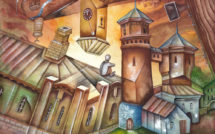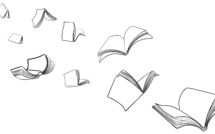
Pensées Françaises Contemporaines: An Interdisciplinary Program Promoting French Approaches in the Social Sciences and Humanities

This is part of our Campus Spotlight on Europa-Universität Viadrina.
The Franco-German program “Pensées françaises contemporaines” (PFC) is an original interdisciplinary cooperation project between the European University Viadrina (EUV), Frankfurt (Oder), the University Paris 1 Panthéon-Sorbonne, and the Franco-German research Centre Marc Bloch in Berlin. At the University Viadrina, the program strengthens the examination of diversity in French scientific thinking in teaching and research. In doing so, it takes into account the Viadrina’s founding mission to promote European perspectives as a German-Polish university situated at the German-Polish border. Furthermore, it fosters a wide range of public events and intensive research collaborations to underline the position of the Viadrina in the Weimar Triangle―a trilateral cooperation between France, Germany, and Poland on European and international affairs. Similar structures support Panthéon-Sorbonne and the Viadrina, where cultural studies, law, and economics coexist, thus allowing for strong synergies. The focus is on cultural and social elements of societies seen in their historical, political, legal, and economic dimensions.
Program origins and purposes
The idea for such an interdisciplinary project was launched in 2008 when a French lecturer in economics (Arnaud Lechevalier) from the University Paris 1 Panthéon-Sorbonne, who was already associated with the Centre Marc Bloch, was invited by Viadrina’s president Gesine Schwan to teach in the Master of European Studies (led Timm Beichelt.) Since 2012, Paris 1 and the Viadrina have signed an official strategic partnership to officialize this nascent and successful cooperation. By 2015, at the initiative of former invited professor and coordinator Nicolas Hubé (Paris 1), the Centre Marc Bloch would also become a partner institution in the program. The special Chair Pensées françaises contemporaineswas created, which would allow for a permanent member of one of the faculties of Paris 1 to be invited to teach his/her field of specialty in his/her discipline every semester/year. The originality of the program is that it works on a fully interdisciplinary basis in the fields of social sciences and humanities. At the Viadrina, it is hosted in the Master of European Studies of the Faculty of Social Sciences and Culture, but also open to the faculties of law, economics (and soon digital studies as well.) During his/her stay at the Viadrina, the invited professor is assisted by a student and teaches a seminar in French and one other topic either in German or in English. Thus, the lecturer introduces a piece of “French thinking” into the Master’s studies curriculum by presenting how his/her discipline in France tackles an issue of common interest.
While Viadrina faculty have been welcomed at Paris 1 for teaching or research, so far, around ten faculty have been invited to the Viadrina from fields as varied as economics, law, political science, philosophy, history, and art history.[1]They have organized numerous conferences and workshops in cooperation with Paris 1, the Centre Marc Bloch, as well as other institutional partners in Berlin, in Germany at large, and abroad. These events have provided opportunities for the publication of articles and books mainly in French, German, and English. Since 2015, the cooperation with the Centre Marc Bloch has been, in this latter respect, particularly lively[2]. Paris 1 professors have also been invited to teach at the Viadrina within the DAAD framework (German Foreign Exchange Service).
Interdisciplinary and plurilingual approaches and outputs
As the invited professors teach in a Master’s degree where multi-lingualism is the rule (student have access to seminars in German, English, French, and Polish) and are also associated researchers at the CMB, where German, French and English are used every day, they evolve in a privileged atmosphere for the development of Franco-German and international collaborative projects. This facilitates the presentation and diffusion of their disciplinary knowledge, but also confronts it to that of colleagues who might have different nationalities, backgrounds, and disciplinary approaches. Furthermore, the Viadrina language center offers language courses in French, for which the content is adapted to match the topic taught by the invited professor. This provides the opportunity for students to improve their knowledge of French into more thematic depth.
Invited professors have taught on diverse topics and disciplines, and sometimes also co-taught with colleagues from the Viadrina in:
- Economics: courses have addressed issues related to borders and social Europe. Activities organized with the Centre Marc Bloch and the Humboldt University led to publications on the making of a European constitutional treaty in the early 2000s and on evolutions towards a more social Europe;
- Political science: courses have addressed French and German political science in perspective, media and communication in the European Union, as well as the sociology of French and European institutions. There were also courses on representatives and public policies and the sociology of French and German political institutions;
- History and art history: courses have addressed the history of Islam and global history, the memory and political challenges of the Great War (1914-2014), historical policy in the Cold War in Eastern Europe, as well as the impact of socialism in Frankfurt (Oder). The latter included work on local archives and memory of socialism in the German Democratic Republic. Other courses covered the notion of ground in art history, visual art from the Renaissance until today, or art and power;
- Philosophy and literature: courses have addressed religion and globalization and a critique of religion today, and oath, confession and promise. Other courses have covered the history of epistemology, figures of thought: multiple personalities, autism, obesity; and there was a masterclass on aesthetics and philosophy with French philosopher Jacques Rancière;
- Law: courses have addressed the building of European civil procedure, and French theory and the legal construction of Europe. Next year, the Viadrina will welcome a lawyer specializing in European social and labor issues.
The events the invited professors have organized―bringing together colleagues ranging from highly profiled scholars to (post-)doctoral students―have been oriented towards issues closely linked to their own field of research. However, seminars, study days, and conferences have opened a more interdisciplinary dialogue and often were paired with events taking place at the Centre Marc Bloch, launching lively debates among scholars based in both Berlin and Frankfurt (Oder), as well as among students.
In June 2019, art historian Jollet invited several key figures from France and Germany to a joint workshop between the Viadrina and the CMB, to think about and discuss ideas around the notion of ground(s) in art history. Former Paris 1 professors organized exhibitions at the Institut Français in relation to conferences and around their research topics. Movies like Gérard Noiriel’s Monsieur Chocolat were featured, followed by a discussion with the film director who was present. The local and national media in both France and Germany reported and commented on these numerous events.
A great number of publications came out of these activities.[3] For example, books were published on border and border regions in Europe in relation to the EUV research factory “B/Orders in Motion,” [4] as well as on social Europe and “what the eurozone crisis is doing to Europe’s social dimension.”[5] Other books resulting from a stay at the Viadrina tackled the issue of memory of socialism, forgotten places and living archives in the GDR and in Eastern Europe. For example, Paris 1 historian Nicolas Offenstadt built on his work on original archives he discovered in places that had been forgotten. His book presentation at the library of Frankfurt (Oder) in 2019 was of much interest to the local population, as there are still ongoing issues regarding abandoned buildings―for example a cinema built during the GDR, which the population would like to rehabilitate and reopen to the public. The fact that a French historian had tackled German issues opened up new research perspectives and shed new light on what were considered national and sometimes very local issues.
Further developments for a dynamic program
After the renewal of the cooperation agreement in 2017, a stipend program for doctoral students (so far, law, arts, and geography students have participated) was added to the common activities. Starting in 2018, this provided support for doctoral students from the Viadrina to spend between one to three months at Paris 1 and vice-versa. Doctoral students from Paris 1 are also automatically associated with the Centre Marc Bloch. As an example, extending her fieldwork to Germany allowed Barbara Portailler―a doctoral student from Paris 1 in arts and crafts―to successfully create the now prominent Franco-German project―”Squared Thoughts,”[6] which has resonated with current international concerns about the re- or up-cycling of objects. Her work was exhibited at the Viadrina in Frankfurt (Oder) in 2019.[7]
In 2018, the PCF program included the “Rendez-Vous sur l’Oder,”[8] another successful project at the Viadrina launched in 2007 as part of a cooperation program between the Viadrina and University Paris 8, which has invited French-speaking colleagues or specialists to debate over issues matching the interests of a Paris 8 invited professor. Up to 2016, more than forty-two meetings took place. After an interruption due to one of their leaders leaving for another post, the “Rendez-Vous” were re-launched with art historian Jollet (Paris 1) around the topic of “Visibility-Invisibility,” giving way to debates around the work of prominent art historians Martin Schieder (University of Leipzig), Ursula Ströbele (ZI Munich), Pierre Wat (University Paris 1), and Thomas Gaehtgens (Free University Berlin, Former director of the Getty Center in L.A.). They presented their research on art history on the notions of aesthetics, nature, monuments, memory and art, and highlighted ways in which visibility or non-visibility play a role in relation to their respective research object. The historian Thomas Serrier (now University Lille) presented his latest publication and other works by European colleagues on the notion of memory and Pierre Nora’s lieux de mémoire.
Cooperation between Paris 1 and the Viadrina was eventually complemented by the creation of the double Master’s degree “Aesthetics, Literature, Philosophy” (led by Philippe Büttgen and Andrea Allerkamp).[9] The Master is centered on literary hermeneutics from the perspective of tultural heory and cultural theory as a starting point for Frankfurt literary studies, a conception dealing with the European model of the reception and interaction between literature, philosophy, and art. The Cultural-Theoretical Function of Frankfurt Literary Studies,” and a program in littrary studies focus on literary hermeneutics from the perspective of cultural Theory.[10]
In February 2020, the three institutions renewed their strategic partnership for five more years, in the presence of the French Ambassador to Germany in Berlin.[11] Going forward, the core ambition is to keep doing what works and to look beyond a Franco-German cooperation, for example by including Poland or other third countries. In the scope of the creation of the European New School of Digital Studies,[12] another potential direction is to expand the field into digital studies to deepen the cooperation between Paris 1, the Viadrina, and the CMB―an issue which the current corona-crisis will certainly boost.
Elsa Tulmets is co-coordinator of the Franco-German program “Pensées françaises contemporaines” at the European University Viadrina, Frankfurt (Oder). Holding a doctoral and a habilitation degree in Political science, she is also associated researcher at the Centre Marc Bloch, where she works on European foreign policy, as well as the role of France, Germany, and some Central Eastern European countries in the management of European crises.
References:
[1] A full list of teaching activities is available here.
[4] https://www.borders-in-motion.de/de/index.html.
[5] Lechevalier, A. Wielgohs, J. (eds). Social Europe – A dead end: What the Eurozone crisis is doing to Europe’s social dimension (Studies in European Cooperation). Copenhagen, Djof Publishing, 2015. 278 pp. ISBN 978-87-574-3437-8.
[7] “Squared Thoughts” project on Instagram.
[8] Project launched in 2007 by Thomas Serrier (Paris 8) and Andreas Bahr (EUV). Rendez-Vous sur l’Oder previous activities.
[9] More information on the double degree here and here.
[10] Information retrieved from: https://www.kuwi.europa-uni.de/en/studium/master/litwiss/index.html
[11] Renewal of the Strategic Partnership
[12] The European New School of Digital Studies
Published on June 3, 2020.




